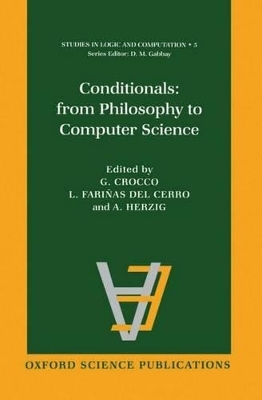
Conditionals: From Philosophy to Computer Science
Seiten
1995
Clarendon Press (Verlag)
978-0-19-853861-5 (ISBN)
Clarendon Press (Verlag)
978-0-19-853861-5 (ISBN)
Internationally recognized logicians present current thinking on the understanding of the role of deduction in human reasoning.
Understanding the role of deduction in human reasoning has been an important activity in philosophy, logic, and more recetnly artificial intelligence. The basic patter of this kind of reasoning can be represented by conditional expressions of the form `if...then.' There are various kinds of conditionals that fit into this pattern, such as counterfactual conditionals (`if it were the case that A then it would be the case that B'), causal conditionals (`if A then causally B'), action conditionals (`if A then B is obtained'), conditional obligations (`if A then B should be brought about'), generic conditionals (`if A then normally B')etc. The common pattern to all these constructions is their conditional form which connects the antecedetn to the consequent in such a way that the antecedent represents a condition (or a context) for the consequent.
The general question arises: is it possible to give a formal logical account of these constructions? This question is considered in this volume by a group of internationally recognized pure and applied logicians and computer scientists. Their papers reflect all the current research in this subject, and should serve as a guide for future development.
Understanding the role of deduction in human reasoning has been an important activity in philosophy, logic, and more recetnly artificial intelligence. The basic patter of this kind of reasoning can be represented by conditional expressions of the form `if...then.' There are various kinds of conditionals that fit into this pattern, such as counterfactual conditionals (`if it were the case that A then it would be the case that B'), causal conditionals (`if A then causally B'), action conditionals (`if A then B is obtained'), conditional obligations (`if A then B should be brought about'), generic conditionals (`if A then normally B')etc. The common pattern to all these constructions is their conditional form which connects the antecedetn to the consequent in such a way that the antecedent represents a condition (or a context) for the consequent.
The general question arises: is it possible to give a formal logical account of these constructions? This question is considered in this volume by a group of internationally recognized pure and applied logicians and computer scientists. Their papers reflect all the current research in this subject, and should serve as a guide for future development.
1. Introduction ; 2. The emperor's new clothes: some recurring problems in the formal analysis of counterfactuals ; 3. A unified view of consequence relation, belief revision, and conditional logic ; 4. Defeasible logics: demarcation and affinities ; 5. Commonsense entailment: a conditional logic for some generics ; 6. The Ramsey test revisited ; 7. Epistemic conditionals, snakes and stars ; 8. Conditional action ; 9. Of the revision of conditional belief sets ; 10. Conditional objects, possibility theory and default roles ; 11. Conditional implications and non-monotonic consequence
| Erscheint lt. Verlag | 30.11.1995 |
|---|---|
| Reihe/Serie | Studies in Logic and Computation ; 5 |
| Zusatzinfo | line figures |
| Verlagsort | Oxford |
| Sprache | englisch |
| Maße | 161 x 241 mm |
| Gewicht | 697 g |
| Themenwelt | Geisteswissenschaften ► Philosophie ► Logik |
| Mathematik / Informatik ► Mathematik ► Logik / Mengenlehre | |
| Naturwissenschaften | |
| ISBN-10 | 0-19-853861-8 / 0198538618 |
| ISBN-13 | 978-0-19-853861-5 / 9780198538615 |
| Zustand | Neuware |
| Haben Sie eine Frage zum Produkt? |
Mehr entdecken
aus dem Bereich
aus dem Bereich
ein Gegenentwurf zum kurzfristigen Denken : so werden wir zu den …
Buch | Hardcover (2023)
REDLINE (Verlag)
18,00 €


